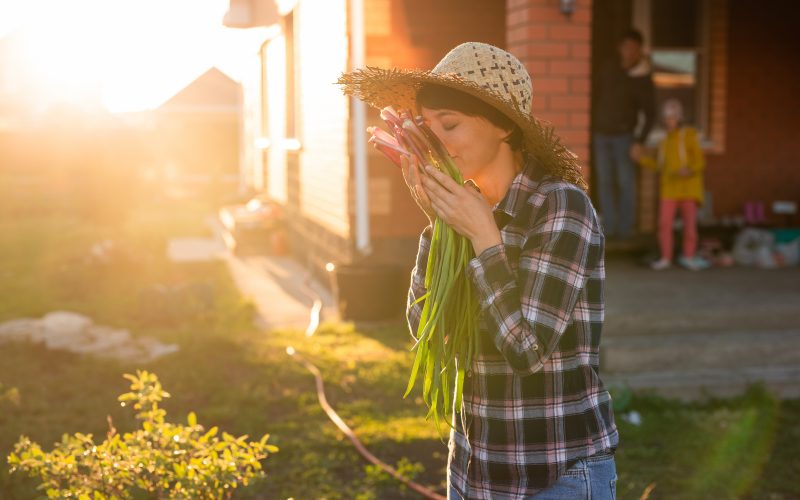If there is one thing that the past few years has taught us, it is that our health is precious. At Gills Onions, we are dedicated to promoting healthy living. We do that by employing sustainable business processes for a healthy planet, growing vegetables that promote physical health, and using responsible agricultural practices for healthy soil.
Why do we put so much time and effort into caring for dirt? Because soil health and human health are connected.
How Soil Affects Your Health
Soil can affect our health in many ways. Some are good, and some are bad. Some are clear and direct, while others aren’t as obvious.
Let’s look at the good first. Soil is the source of elements that are essential for human health. According to the European Journal of Soil Science, “Hydrogen, oxygen, carbon, nitrogen, sodium, potassium, calcium, magnesium, phosphorous, sulphur, and chlorine make up 99.9% of the atoms in the human body, with all but hydrogen, oxygen, and carbon having soil as their major source.” Does that mean you should go out and eat a handful of dirt? Absolutely not. The nutrients from the dirt are transferred to the plants and animals that are responsible for our diets every day.
But what happens if the soil isn’t healthy? Some soil, either naturally or through human intervention, can contain imbalanced or even toxic levels of elements or chemical compounds that follow those same pathways of transfer into our diet and into our bodies – all without us even realizing it.
Microbes: Small but Strong
The soil microbiome is the world’s most hopping community that you’ve never heard about. The topmost layer of the soil where plants put down their roots is humming with interactions between microscopic organisms like viruses, bacteria, fungi, protozoa, and algae. This underground exchange is responsible for healthy plants – which are responsible for healthy animals and humans — by, as Agriculture.com describes, “promoting germination, stimulating roots, accelerating growth, and bolstering resistance to disease.” It’s good stuff.
Soil microbes have a huge impact on the nutritional health of our food, but our diet and the dirt that we come in contact with every day can also affect our own microbiome. That’s right. Human beings host a thriving community of microbes, too. The Atlantic reports that, “The normal microbial make-up of a healthy human, a collection of bacteria, fungi, one-celled archaea, and viruses … weighs about three pounds – the same as our brain.”
We need microbes for healthy food and healthy bodies, but unfortunately, our society has unknowingly destroyed many of the vital microbes in our soil by overusing chemical fertilizers, pesticides, fungicides, and herbicides and by over-tilling. Fortunately, advances in technology allow us to repair the damage through conscious and regenerative farming practices that repair damaged soil and restore healthy microbial communities.
Caring for You Through Our Soil
We grow our onions “The Gill Way,” a process that ensures we maintain soil health and promote sustainable agriculture. We know that everything that happens to our soil, happens to our onions — and that means it happens to every person who eats our onions, too.
We use soil science to understand the composition and microbiology of the soil and how it will interact with plant biology. Our onions and our fields work together to make each other stronger and healthier. Growers boost soil health with a balanced blend of macro- and micronutrients that work together with carbon and organic materials to create an environment that makes microbes happy and aid in water absorption.
Healthy soil helps our onions grow larger, more aggressive root mass. Better roots mean the plants are more productive and better able to fight against harsh weather, insects, and disease. So, our growers can use fewer chemicals.
You may look out your window and just see dirt, but we see a vital resource. Only 30% of our planet is land, and of that land, only 11% is used in crop production. By caring for our soil, we know we are caring for you, our customers, and that’s just how it should be.
Ready to try onions grown “The Gill Way”? Contact our sales department to learn more.

